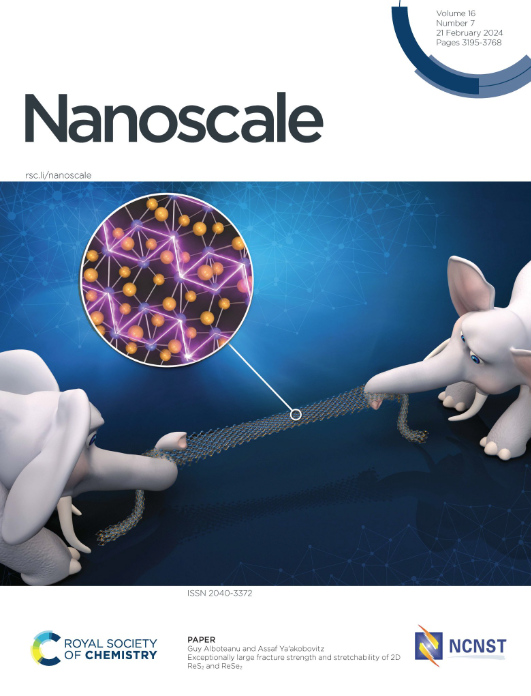Calcium Citrate Nanoparticles as the New Frontier in Metabolic Acidosis Treatment
IF 5.1
3区 材料科学
Q1 CHEMISTRY, MULTIDISCIPLINARY
引用次数: 0
Abstract
Metabolic acidosis often coexists with systemic diseases, contributing to cellular dysfunction through mechanisms such as protein degradation, bone loss, renal impairment, inflammation, oxidative stress, and apoptosis. Standard alkalinizing agents, such as sodium bicarbonate and sodium citrate, can cause gastrointestinal side effects, limiting their long-term use. To address this, we developed calcium citrate nanoparticles (CN) and calcium citrate-loaded calcium carbonate nanoparticles (CCN) as potential adjuvant therapies or drug carriers. CN and CCN exhibited particle sizes of 50 to 70 nm and 60 to 80 nm, with zeta potentials of -16.1 and -13.0 mV, and citrate content of 31% and 25%, respectively. Both nanoparticles showed efficient cellular uptake in normal and acidic environments with minimal cytotoxicity at 1 mg / ml. Although CN had only a slight alkalinizing effect in vitro, intracellular and extracellular bicarbonate levels did not differ significantly between treatment groups after 24 hours. In particular, acidosis-induced oxidative stress was significantly attenuated by CN and CCN, outperforming sodium citrate. Flow cytometry further demonstrated superior protection by CN and CCN against acidosis-induced cell injury. These findings support the potential of calcium citrate nanoparticles as safe and effective adjuvant therapies for metabolic acidosis, offering enhanced antioxidant protection and reduced cellular damage compared to conventional treatments.柠檬酸钙纳米颗粒作为代谢性酸中毒治疗的新前沿
代谢性酸中毒通常与全身性疾病共存,通过蛋白质降解、骨质流失、肾脏损害、炎症、氧化应激和细胞凋亡等机制导致细胞功能障碍。标准碱化剂,如碳酸氢钠和柠檬酸钠,可引起胃肠道副作用,限制其长期使用。为了解决这个问题,我们开发了柠檬酸钙纳米颗粒(CN)和柠檬酸钙负载碳酸钙纳米颗粒(CCN)作为潜在的辅助治疗或药物载体。CN和CCN的粒径分别为50 ~ 70 nm和60 ~ 80 nm, zeta电位分别为-16.1和-13.0 mV,柠檬酸盐含量分别为31%和25%。两种纳米颗粒在正常和酸性环境中均表现出有效的细胞摄取,且在1 mg / ml时具有最小的细胞毒性。尽管CN在体外仅具有轻微的碱化作用,但在24小时后,处理组之间的细胞内和细胞外碳酸氢盐水平没有显着差异。特别是,CN和CCN显著减弱酸中毒诱导的氧化应激,优于柠檬酸钠。流式细胞术进一步证实了CN和CCN对酸中毒引起的细胞损伤具有良好的保护作用。这些发现支持了柠檬酸钙纳米颗粒作为代谢性酸中毒安全有效的辅助治疗的潜力,与传统治疗相比,它提供了增强的抗氧化保护和减少细胞损伤。
本文章由计算机程序翻译,如有差异,请以英文原文为准。
求助全文
约1分钟内获得全文
求助全文
来源期刊

Nanoscale
CHEMISTRY, MULTIDISCIPLINARY-NANOSCIENCE & NANOTECHNOLOGY
CiteScore
12.10
自引率
3.00%
发文量
1628
审稿时长
1.6 months
期刊介绍:
Nanoscale is a high-impact international journal, publishing high-quality research across nanoscience and nanotechnology. Nanoscale publishes a full mix of research articles on experimental and theoretical work, including reviews, communications, and full papers.Highly interdisciplinary, this journal appeals to scientists, researchers and professionals interested in nanoscience and nanotechnology, quantum materials and quantum technology, including the areas of physics, chemistry, biology, medicine, materials, energy/environment, information technology, detection science, healthcare and drug discovery, and electronics.
 求助内容:
求助内容: 应助结果提醒方式:
应助结果提醒方式:


